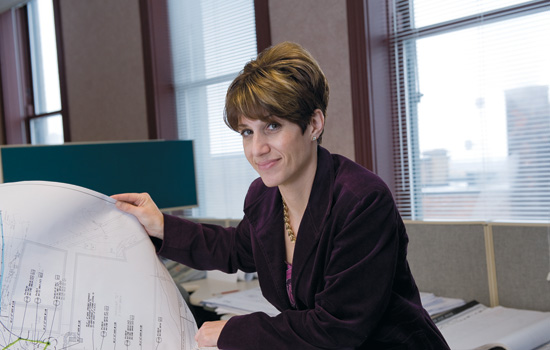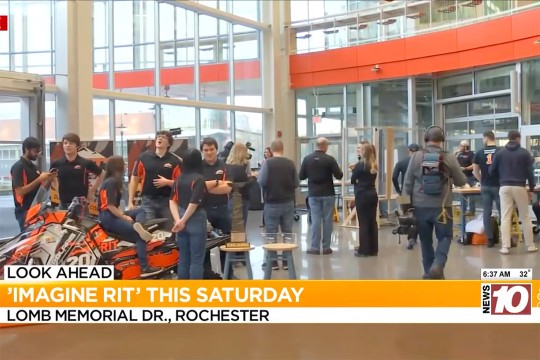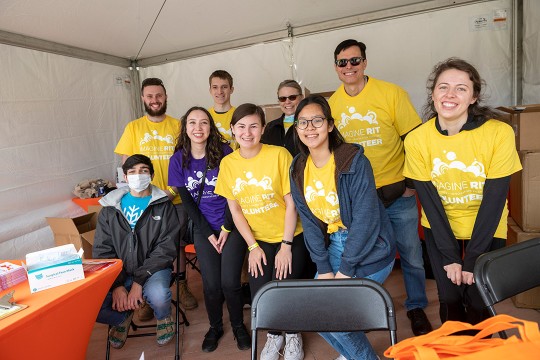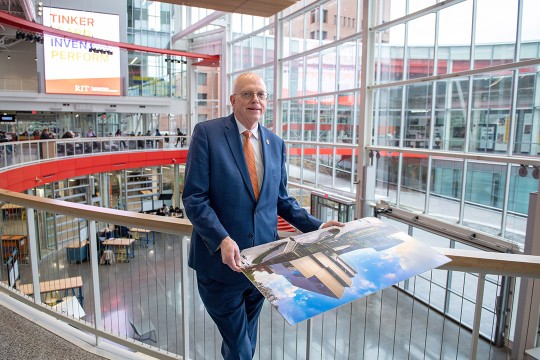Building Support
Alumnae reach out to current, future engineers
A. Sue Weisler
Mona Carbonel ’95 says there weren’t many women in engineering classes when she was in school. Carbonel now works with WE@RIT and has supervised engineering co-ops to make it easier for young women to enter the male-dominated field.
When Mona Carbonel ’95 started at RIT in 1991, there were three women in her civil engineering technology classes.
Emily Cole ’99 was one of a few in industrial engineering and Mary Ellen Coleman ’86, ’02 managed the even rarer field of computer engineering.
All three negotiated the maze of male-dominated classrooms. They were also among the first to participate in fledgling engineering organizations on campus like the women in engineering program, WE@RIT, and the student section of the Society for Women Engineers.
Now, as members of the external advisory board for WE@RIT, they are among key women who have returned to RIT to ensure that more students, especially young women, are prepared for the realities of the workplace.
“They learned the value of networking and learning from professionals in the field to enhance leadership skills, and also how important it is to extend a hand to those following in their footsteps,” says Margaret Bailey, executive director of WE@RIT.
The early years
When Bailey started as a faculty member in the Kate Gleason College of Engineering in 2003, she walked into a place that had already set the groundwork to improve gender diversity.
There were loosely constructed meetings of female students and faculty from the college and one formal organization, the student section of the Society for Women Engineers, supervised by then-associate dean Margaret Anderson.
Anderson and Bailey worked together to establish more in-house programs and support for the young women in the college. They also worked on outreach for prospective students.
When they began developing programs for younger girls, the college students played a big role in making them both fun and relevant.
One of those students was Christina Alzona, who held a co-op position with Bailey in 2003.
“I think of her every time we do Park & Ride because she helped me develop it,” says Bailey. “She came up with the name and she knew we wanted it to be about robotics and an amusement park theme.”
Park & Ride, a two-day program for middle school girls to introduce physics and engineering concepts, was launched in April 2004 on a shoestring. There were limited resources, few participant prospects and minimal support staff, with Bailey and Alzona stuffing envelopes and managing the process from registration to event activities.
Through their efforts, 15 girls enrolled. Today, there are waiting lists.
The program used the popular Lego Mindstorm kits. Staff from Disney were invited and talked about amusement park design. RIT faculty and students volunteered.
“They liked the Disney people, they sort of liked us professors, but they really liked the college kids,” Bailey says.
WE@RIT was formally chartered in 2005. That fall, programs for high school girls began and weekend, summer camp and online courses were launched. But the core of WE@RIT always focused on the college-age students. The small groups of young women were encouraged to band together for networking and support.
After the students graduated from RIT, the experiences they had together, and the preparation they had through co-ops, was what eventually provided success in the workplace.
Graduates return
IBM management asked alumna Coleman, an information architect in IBM’s Information Management Support division, to be a liaison to RIT to promote women in science, technology, engineering and mathematics careers. The company provides co-op experiences and has hired many RIT graduates.
“I reached out to the Career and Co-Op office first and they introduced me to Margaret Bailey,” she says. She became a member of WE@RIT’s external advisory board.
Cole, an industrial engineer who now owns her own engineering consulting company, Cole Minds, supervised RIT students when she worked for Delphi Corp. from 2003-09. Her background in lean manufacturing provided the co-ops with hands-on experience in this growing field.
Some were familiar with lean techniques. Others were not. “They were all there to learn,” she says. “I always had specific projects for them and made time to talk to them about their workload at Delphi and at RIT.”
Carbonel also came to the WE external board through the Office of Cooperative Education and Career Services. As vice president and market development leader in the Government and Community Infrastructure Market at Clough Harbour & Associates’ Rochester office, she has managed and supervised several RIT civil engineering co-ops.
She also has served on the RIT co-op department’s advisory board since 2006.
“In engineering and other traditionally male-oriented professions, doors open grudgingly when you’re a female. You have to work harder to gain the confidence of peers—mostly men. Trust has to be developed with your colleagues to be accepted on an equal status,” she says.
Carbonel was able to instill some of that philosophy in 2008 graduate Kathleen Whitten. The civil engineering technology alumna had a co-op at Clough Harbour & Associates and was supervised by Carbonel.
“My first full-time job blossomed out of my co-op at Clough Harbour,” says Whitten. “They really pushed me to be the best I could be and I didn’t feel like a woman engineer—just an engineer.”
Whitten is employed by Mill River Consulting, a civil and environmental engineering company in her hometown of Gloucester, Mass. She is also attending graduate classes in civil engineering at the University of Massachusetts at Lowell.
Tess Ambrose, a 2010 mechanical engineering graduate, also took away a broader perspective about opportunities in the workplace because of WE@RIT.
“Obviously studying hard and doing my best in classes was how I earned my degree, but the personal and professional skills that were honed by the WE@RIT programs is what actually landed interviews and job offers,” says Ambrose, a mechanical engineer with BMP America. The Medina, N.Y., company manufactures technical, non-woven textiles, mechanical components and systems to be used for a variety of industrial equipment.
About a month after finishing her course work, Ambrose had several interviews and a few job offers, narrowing them down to two. One position was highly technical and centered around design work. The other included design work, as well as sales, customer service and manufacturing. “Without my experiences through WE, I would have chosen the strictly technical job,” Ambrose says. “I wouldn’t have had the confidence in myself to excel at a company where I’d be handling a broad range of job functions.”
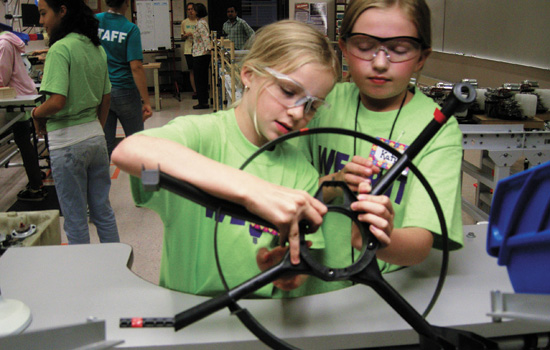 Middle school girls from the Rochester area participated in the Park & Ride program last fall at the Kate Gleason College of Engineering. Jodi Carville, WE@RIT
Middle school girls from the Rochester area participated in the Park & Ride program last fall at the Kate Gleason College of Engineering. Jodi Carville, WE@RIT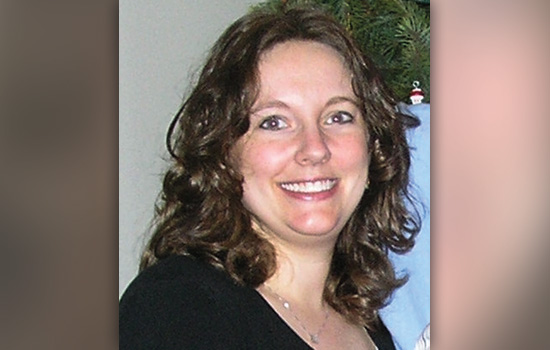 Emily Cole ‘99
Emily Cole ‘99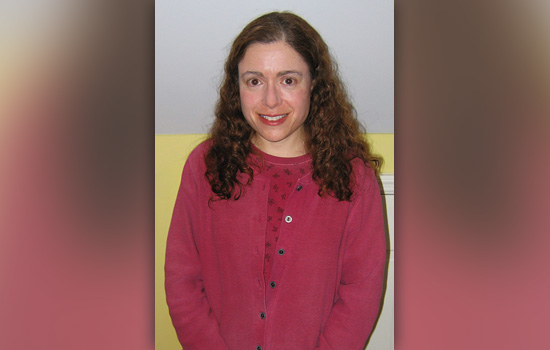 Mary Ellen Coleman ’86, ’02
Mary Ellen Coleman ’86, ’02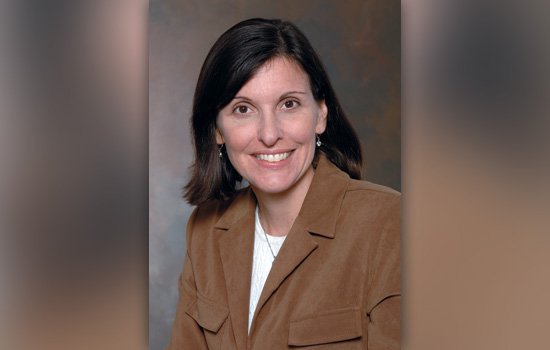 Margaret Bailey
Margaret Bailey










